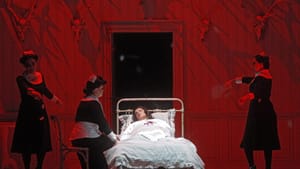Stay in the Loop
BSR publishes on a weekly schedule, with an email newsletter every Wednesday and Thursday morning. There’s no paywall, and subscribing is always free.
Raising one's voice in protest
Anti-Putin protests at the Metropolitan Opera

At the end of the Metropolitan Opera’s new production of Tchaikovsky’s Iolanta on January 29, a man from the audience made his way onto the stage as soprano Anna Netrebko was taking a bow and held up a sign equating Vladimir Putin with Hitler. The intruder walked into the wings, where he was arrested and charged with criminal trespass. (You can see a video of the incident here.)
The protestor objects to Netrebko’s and conductor Valery Gergiev’s public support for Putin on a number of issues, including Russia’s annexation of Crimea and aggression against Ukraine. Netrebko posed for a photo with a separatist leader holding the flag of a pro-Russian organization; both of them signed a public letter in support of Mr. Putin’s stance in Ukraine and Crimea.
The Met audience at that performance reacted to the protest with hostility, gasping and booing when he appeared and applauding when he was hustled off. Met patrons seem to want the sanctity of their temple to be undisturbed.
Are such demonstrations appropriate? No one would deny Netrebko and Gergiev the right to hold their own opinions, but they used their celebrity status to support Putin — their high visibility gave their opinions greater impact than the average person’s. Some who oppose Putin’s actions sought to balance the scale and attract comparable attention.
You could argue that since neither the soprano nor the conductor expressed any political opinion from the stage of the Met, so the protesters should not have come into the opera house. But holding placards outdoors could not make as big an impression as did Netrebko’s and Gergiev’s support for Russian separatists (or aggressors, depending on your view). And the protesters did not interrupt the music but waited until the moment when Netrebko was receiving applause and when her supporters were throwing bouquets of flowers onto the stage. She used her star status to further Putin’s cause, they say, so why shouldn’t they use Netrebko’s celebrity to help the other side?
History repeats
Previously, Netrebko and Gergiev disturbed human rights activists when they refused to join critics of Putin’s laws last year that allowed the arrest of people they suspect of being gay or "pro-gay." The British Independent opined that Netrebko and Gergiev should have expressed support for human rights in 2013, when they starred in Eugene Onegin by Tchaikovsky — who was, of course, a closeted gay man: "What a moment for Netrebko and Gergiev to speak from the stage at the curtain call and make clear their feelings about anti-gay legislation in their homeland.”
Instead, at the Onegin opening night, a ticket-holder shouted: “Anna, your silence is killing Russian gays! Valery, your silence is killing Russian gays!” Other patrons shushed them. Met staffers asked the demonstrators to leave, which they did.
Met general manager Peter Gelb says that he has taken steps to stop any similar demonstrations. I wonder whether by doing so the Met is taking the side of Putin supporters. A radio broadcast was in progress during the Iolanta incident, but the commentators ignored it. Independent journalists, under those circumstances, might have announced what the sign said, and described the reactions of those onstage and in the house. Yet the broadcasters seemed as if they wanted to hush things up — as, indeed, Gelb does.
On February 14, the opera will be broadcast on radio and telecast in movie theaters worldwide. It will be interesting to see if anyone tries to make a political point with so many people watching and listening.
For a response by Robert Zaller, click here.
What, When, Where
Tchaikovsky: Iolanta on a double bill with Bartók: Bluebeard’s Castle. New production at the Metropolitan Opera at Lincoln Center, New York. 212-362-6000 or www.metopera.org.
Broadcast on radio and telecast to cinemas February 14, 2015, at 12:30pm. www.fathomevents.com
Sign up for our newsletter
All of the week's new articles, all in one place. Sign up for the free weekly BSR newsletters, and don't miss a conversation.

 Steve Cohen
Steve Cohen